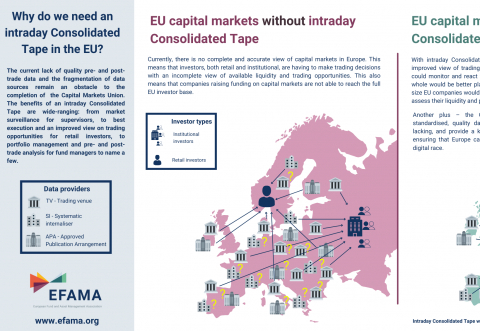We fully support the ambitions of the new CMU Action Plan. Properly executed, it has the potential to boost the fortunes of Europe’s pensioners and savers by creating opportunities for them to share in the upside of Europe’s economic recovery and to create more efficient and better integrated European capital markets, which is key to finance European innovation as well as the transition towards a more sustainable and digital economy.
Capital Markets Union
Building a Capital Markets Union (CMU) serving the needs of European citizens and businesses is as ambitious as it is essential: the effort will enable pensioners and savers to share in the upside of Europe’s economic recovery. In the process, European capital markets also become more efficient and better integrated. This long-term vision is key to financing European innovation and to supporting the transition towards a more sustainable economy.
Increasing retail investors’ participation in capital markets is an essential component for building an effective CMU. Improving access to financial and non-financial information and addressing the high data costs our industry is encountering, are also important steps towards a functioning CMU. All this, while maintaining and improving the attractiveness of the European investment management sector in today's global environment.
EFAMA prepared a list of key actions that are required to reach the CMU objectives from an investor perspective. We have also developed a specific Key Performance Indicator to measure year-on-year progress towards increasing retail participation in capital markets in each member state.
Key objectives for the creation of a Capital Markets Union - EFAMA letter to EU Commissioner McGuinness
Priorities for the investment management industry - EFAMA letter to Portuguese Presidency of the EU
The European investment management industry is helping savers achieve their financial goals and build up retirement savings. Investment management is a vital part of the European economy, providing funding for companies and infrastructure projects and contributing to economic growth and job creation across all Member States.
EFAMA's feedback on the EU Commission's consultation on the Capital Markets Union High Level Forum Final Report
EFAMA Vice-president Peter Branner to speak at POLITICO Live event
Tune in on 12 October at 9.00 am CEST to POLITICO Live’s event “Raising the green game in finance: how can Europe deliver?” with the participation of EFAMA's Vice-president Peter Branner from APG Asset Management. He will be joined by
Market Insights | Issue #5 | Perspective on the net performance of UCITS
Equity UCITS delivered a total net return of 108% in real terms in 2010-2019, whereas bank deposits lost 10% in net value
Towards a deepening of the single market for asset management in the context of an ambitious Capital Markets Union
By Vincent Ingham
Director of Regulatory Policy, EFAMA.
Household Participation in Capital Markets
This report analyses the progress made in recent years by European households in allocating more of their financial wealth to capital market instruments (pension plans, life insurance, investment funds, debt securities and listed shares) and less in cash and bank deposits. It also includes policy recommendations on improving retail participation in capital markets, including for the Retail Investment Strategy currently under discussion.
Some key findings include:
Visual | Why do we need a real-time Consolidated Tape in the EU?
The current lack of quality pre- and post-trade data and the fragmentation of data sources remain an obstacle to the completion of the Capital Markets Union. The benefits of a real-time Consolidated Tape are wide-ranging: from market surveillance for supervisors, to best execution and an improved view on trading opportunities for retail investors, to portfolio management and pre- and post-trade analysis for fund managers to name a few.
Market Insights | Issue #5 | Perspective on the net performance of UCITS
Equity UCITS delivered a total net return of 108% in real terms in 2010-2019, whereas bank deposits lost 10% in net value































